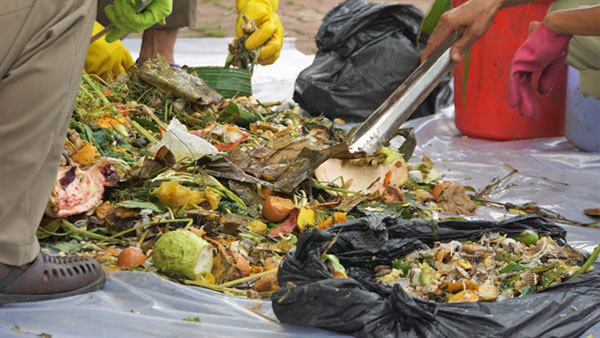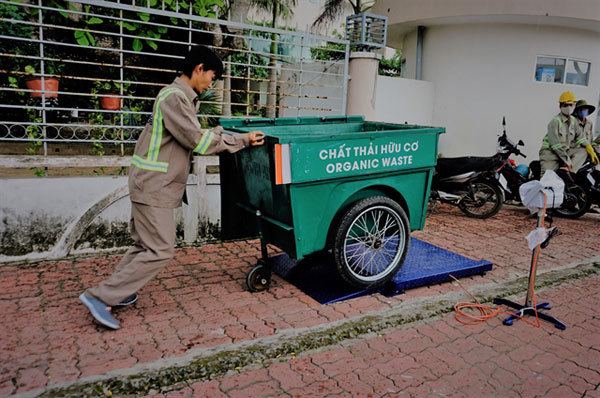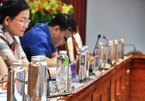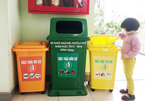 |
| Waste is classified by environmental workers in Long An Province. The WWF and local authorities have begun waste classification at source in Tan An City. Photo courtesy WWF |
The WWF said people in the city would have to classify their waste into three categories: organic waste, recyclable waste and other waste, which would be collected on different days based on their category.
Organic will be used to produce fertiliser, recycled waste will be recycled and the rest will be treated at a factory. This is part of the major efforts being made by the city and province to deal with overloaded landfills in Long An Province, contributing to the prevention of waste, especially plastic waste released into rivers and oceans
In August and September, the WWF worked closely with local authorities to pilot waste separation at source along Binh Dong 2 Street, with the participation of 430 households.
More than 95 per cent of the households actively participated in the programme. Organic waste made up about 45 per cent of the total, and all the waste was collected and transported to the Tam Sinh Nghia waste treatment plant.
This initial success is why authorities have decided to replicate the model across Ward 3, with about 4,800 households.
 |
| A worker pushes a waste cart to collect household garbage as part of a waste classification at source campaign in Tuy An City. Local people and businesses in the city began waste classification at source this month. Photo courtesy of WWF |
"Garbage and the overloaded landfills are always a problem for the city and we have had a hard time finding a comprehensive solution. The success of the pilot model on Binh Dong 2 has given us the confidence and determination to expand the model to Ward 3 and Tan An City in the near future”, said vice chairman of Long An People’s Committee, Pham Van Canh.
It is estimated that 80 per cent of plastic waste in the oceans comes from cities with high population densities. An insufficient terrestrial waste management system combined with increasing sales of single-use plastic products has seriously added to the marine plastic problem. Tan An City lies downstream on the Mekong River, one of the 10 most polluted rivers in the world. If the waste problem in the city can be solved, it will contribute greatly to reducing plastic waste in the river and the ocean and set an example for others to follow.
WWF-Vietnam Project Manager of Reduction of Marine Litter by Improved Waste Management Measures in the Mekong Area Trinh Thi Long shared: “Waste separation at source is not that difficult and many countries already do it. In Vietnam, we do not have this system yet due to numerous factors, including people's habits and lack of waste treatment systems. The success of Binh Dong 2 has proven to us this is feasible and that people support it. I believe that with increased public awareness and strong support from authorities, our waste problems will be resolved in the near future so that waste can become a resource in Vietnam."
The Reduction of Marine Litter by Improved Waste Management Measures in the Mekong Area project is being sponsored by the German Federal Ministry of Environment, Nature Conservation and Nuclear Safety, Kaldewei and Straniak (Germany).
Helene Paust, First Secretary – Deputy Head of Development Cooperation at the Embassy of the Federal Republic of Germany in Vietnam, said: “We are thrilled that the project has started because the model of separating waste at source hasn't received much interest and similar projects have failed. When we can convince people that it is them, and not anyone else, who can solve the problems of the environment in which they live, they will have greater motivation and belief in what they are doing. Perhaps this will be the secret to the success of this activity.”
Meanwhile, the UNDP and Women's Union of Binh Thuan Province have started a project themed ‘Integrating Resources for the Reduction of Ocean Waste’ with the aim of enhancing awareness and changing behaviour about sorting waste at source among communities, social organisations and marine businesses in Tuy Phong District, Phu Quy Island and Phan Thiet City.
The consumption of single-use plastic products and non-biodegradable plastic bags will be cut towards an end goal of no plastic bags or single-use plastic products through the implementation of policies and activities to reduce waste flows from both land and sea operations into the environment.
The project will be implemented over the course of 24 months as part of a larger project funded by the Norwegian Ministry of Foreign Affairs entitled ‘Scaling Up a Socialised Model of Domestic Waste and Plastic Management in 5 Cities’ (DWP5C) implemented in Quang Ninh, Da Nang, Binh Dinh, Binh Thuan and Binh Duong.
Binh Thuan Province is currently facing huge environmental problems, especially the discharge of plastic waste.
"Disposal of trash into the environment has generated a large amount of waste which is affecting the environment and causing damage to marine ecosystems, especially waste from the ocean,” said Le Tuan Phong, vice chairman of Binh Thuan's People's Committee.
“The implementation of this project is very important for accelerating local action for the National Action Plan on Marine Litter Management. The project will empower the important role of the informal waste sector and promote strong collaboration and partnership between the informal and formal sector in waste management,” said Sitara Syed, UNDP Deputy Resident Representative in Vietnam. VNS

Government aims to set an example in reducing plastic waste
Vietnam is the fourth largest plastic polluter in the world. Each year, up to 700,000 tonnes of plastic waste is thrown away and not recycled properly.

Revised environmental protection highlights recycling: National Assembly
The principle of “considering waste as a resource” mentioned in the environmental protection bill introduced in the National Assembly’s meeting in April has been clarified, emphasising recycling and reusing.